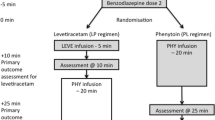Abstract
Purpose
Phenytoin is one of the most used antiepileptic drugs (AEDs), but it has serious potential side effects and drug interactions. Although studies have shown levetiracetam to have a much lower side-effect profile, its efficacy when compared with phenytoin is debatable. In our study, we aimed to determine the factors that cause seizure recurrence and to compare the efficacy of levetiracetam and phenytoin in the treatment of convulsive status epilepticus (CSE) and acute repetitive seizures (ARS).
Methods
In this study, 185 patients diagnosed with CSE or ARS and aged between 1 month and 18 years who received intravenous levetiracetam or phenytoin as a second-line AED were retrospectively evaluated.
Results
A total of 185 patients were included in the study, 85 (45.9%) girls and 100 (54.1%) boys.While 54.1% (n = 100) of the patients were given phenytoin, levetiracetam was administered to 45.9% (n = 85) of them. The rates of cessation of seizure and prevention of seizure recurrence for 24 h were 84% for phenytoin and 78.8% for levetiracetam, without a significant difference (p > 0.05). Having active seizures on admission to the emergency department and an age of < 36 months were significantly related to seizure recurrence (p < 0.01).
Conclusions
Our results support that the intravenous administration of levetiracetam as the second-line treatment for CSE and ARS in children is as effective as the intravenous administration of phenytoin.
Similar content being viewed by others
References
Lee YJ, Yum MS, Kim EH, Ko TS (2016) Intravenous levetiracetam versus phenobarbital in children with status epilepticus or acute repetitive seizures. Korean J Pediatr 59(1):35–39. https://doi.org/10.3345/kjp.2016.59.1.35
Besli GE, Yuksel Karatoprak E, Yilmaz S (2020) Efficacy and safety profile of intravenous levetiracetam versus phenytoin in convulsive status epilepticus and acute repetitive seizures in children. Epilepsy Behav 111:107289. https://doi.org/10.1016/j.yebeh.2020.107289
Vanhaerents S, Gerard EE (2019) Epilepsy emergencies: status epilepticus, acute repetitive seizures, and autoimmune encephalitis. Contin Lifelong Learn Neurol 25(2):454–476. https://doi.org/10.1212/CON.0000000000000716
Lyttle MD, Rainford NEA, Gamble C et al (2019) Levetiracetam versus phenytoin for second-line treatment of paediatric convulsive status epilepticus (EcLiPSE): a multicentre, open-label, randomised trial. Lancet 393(10186):2125–2134. https://doi.org/10.1016/S0140-6736(19)30724-X
Sculier C, Gaínza-Lein M, Sánchez Fernández I, Loddenkemper T (2018) Long-term outcomes of status epilepticus: a critical assessment. Epilepsia 59:155–169. https://doi.org/10.1111/epi.14515
Erkek N, Öztürk N, Şevketoğlu E et al (2020) Çocuk Acil Tıp ve Yoğun Bakım Derneği Status Epileptikus Tedavi Protokolü. J Pediatr Emerg Intensive Care Med 7(Suppl-1):64–71. https://cms.galenos.com.tr/Uploads/Article_41608/CAYD-7-64.pdf
Glauser T, Shinnar S, Gloss D et al (2016) Evidence-based guideline: treatment of convulsive status epilepticus in children and adults: Report of the guideline committee of the American epilepsy society. Epilepsy Curr 16(1):48–61. https://doi.org/10.5698/1535-7597-16.1.48
Shorvon S (2012) Clinical trials in acute repetitive seizures and status epilepticus. In: Epileptic Disorders 14(2):138–147. https://doi.org/10.1684/epd.2012.0514
Wani G, Imran A, Dhawan N, Gupta A, Giri J (2019) Levetiracetam versus phenytoin in children with status epilepticus. J Fam Med Prim Care 8(10):3367–3371. https://doi.org/10.4103/jfmpc.jfmpc_750_19
McTague A, Kneen R, Kumar R, Spinty S, Appleton R (2012) Intravenous levetiracetam in acute repetitive seizures and status epilepticus in children: experience from a children’s hospital. Seizure 21(7):529–534. https://doi.org/10.1016/j.seizure.2012.05.010
Berning S, Boesebeck F, Van Baalen A, Kellinghaus C (2009) Intravenous levetiracetam as treatment for status epilepticus. J Neurol 256(10):1634–1642. https://doi.org/10.1007/s00415-009-5166-7
Trabacca A, Profice P, Costanza MC, Gesualdi M, De Rinaldis M (2007) Levetiracetam in nonconvulsive status epilepticus in childhood: a case report. J Child Neurol 22(5):639–641. https://doi.org/10.1177/0883073807302612
Trinka E, Cock H, Hesdorffer D, a, (2015) A definition and classification of status epilepticus - report of the ILAE Task Force on Classification of Status Epilepticus. Epilepsia 56(10):1515–1523. https://doi.org/10.1111/epi.13121
Jafarpour S, Hirsch LJ, Gaínza-Lein M, Kellinghaus C, Detyniecki K (2019) Seizure cluster: definition, prevalence, consequences, and management. Seizure 68:9–15. https://doi.org/10.1016/j.seizure.2018.05.013
Dalziel SR, Borland ML, Furyk J et al (2019) Levetiracetam versus phenytoin for second-line treatment of convulsive status epilepticus in children (ConSEPT): an open-label, multicentre, randomised controlled trial. Lancet 393(10186):2135–2145. https://doi.org/10.1016/S0140-6736(19)30722-6
Lewena S, Pennington V, Acworth J et al (2009) Emergency management of pediatric convulsive status epilepticus: a multicenter study of 542 patients. Pediatr Emerg Care 25(2):83–87. https://doi.org/10.1097/PEC.0b013e318196ea6e
Noureen N, Khan S, Khursheed A et al (2019) Clinical efficacy and safety of injectable levetiracetam versus phenytoin as second-line therapy in the management of generalized convulsive status epilepticus in children: an open-label randomized controlled trial. J Clin Neurol 15(4):468–472. https://doi.org/10.3988/jcn.2019.15.4.468
Cook R, Davidson P, Martin R (2019) Levetiracetam is a useful alternative to phenytoin for epileptic seizures in children. BMJ 367:I5464. https://doi.org/10.1136/bmj.l5464
Singh K, Aggarwal A, Faridi MMA, Sharma S (2018) IV levetiracetam versus IV phenytoin in childhood seizures: a randomized controlled trial. J Pediatr Neurosci 13(2):158–164. https://doi.org/10.4103/jpn.JPN_126_17
Yilmaz U, Yilmaz TS, Dizdarer G, Akinci G, Güzel O, Tekgul H (2014) Efficacy and tolerability of the first antiepileptic drug in children with newly diagnosed idiopathic epilepsy. Seizure 23(4):252–259. https://doi.org/10.1016/j.seizure.2013.12.001
Altındag E, Erdoğan FF, Tezer I, Ozkara C (2017) Management and early treatment of status epilepticus in adults and children. Turk J Neurol 23(4):155–161
Author information
Authors and Affiliations
Contributions
MTK and SGS analyzed the data and drafted the manuscript. MTK critically reviewed the analyses. MTK, SGS, HZ, YC, and YA reviewed and commented on initial and final drafts of the manuscript. All authors have participated in drafting of the manuscript and/or critical revision of the manuscript for important intellectual content. All authors read and approved the final manuscript.
Corresponding author
Ethics declarations
Ethical approval
The study was approved by the Institutional Ethics Committee of the hospital on October 27, 2021. (Registration Number: 2021/514/212/13). The study was conducted in accordance with the ethical principles of the Declaration of Helsinki.
Conflict of interest
The authors declare no competing interests.
Additional information
Publisher's Note
Springer Nature remains neutral with regard to jurisdictional claims in published maps and institutional affiliations.
Supplementary Information
Below is the link to the electronic supplementary material.
Rights and permissions
About this article
Cite this article
Köle, M.T., Sager, S.G., Zeynel, H. et al. Efficacy of intravenous levetiracetam versus phenytoin in convulsive status epilepticus and acute repetitive seizures in children. Childs Nerv Syst 38, 1357–1364 (2022). https://doi.org/10.1007/s00381-022-05543-2
Received:
Accepted:
Published:
Issue Date:
DOI: https://doi.org/10.1007/s00381-022-05543-2




